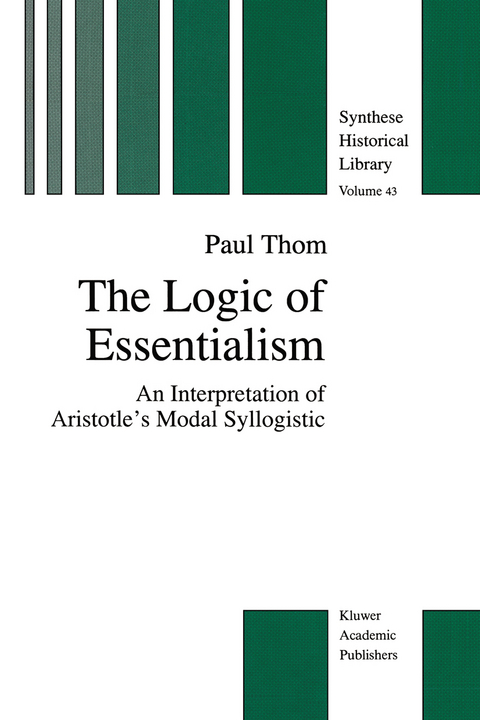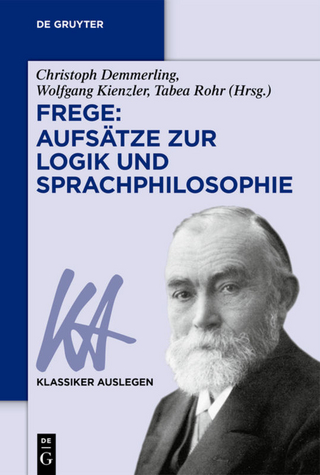
The Logic of Essentialism
Springer (Verlag)
978-0-7923-3987-8 (ISBN)
Aristotle's modal syllogistic has been an object of study ever since the time of Theophrastus; but these studies (apart from an intense flowering in the Middle Ages) have been somewhat desultory. Remarkably, in the 1990s several new lines of research have appeared, with series of original publications by Fred Johnson, Richard Patterson and Ulrich Nortmann. Johnson presented for the first time a formal semantics adequate to a de re reading of the apodeictic syllogistic; this was based on a simple intuition linking the modal syllogistic to Aristotelian metaphysics. Nortmann developed an ingenious de dicto analysis. Patterson articulated the links (both theoretical and genetic) between the modal syllogistic and the metaphysics, using an analysis which strictly speaking is neither de re nor de dicto. My own studies in this field date from 1976, when my colleague Peter Roeper and I jointly wrote a paper "Aristotle's apodeictic syllogisms" for the XXIInd History of Logic Conference in Krakow. This paper contained the disjunctive reading of particular affirmative apodeictic propositions, which I still favour. Nonetheless, I did not consider that paper's results decisive or comprehensive enough to publish, and my 1981 book The Syllogism contained no treatment of the modal syllogism. The paper's ideas lay dormant till 1989, when I read Johnson's and Patterson's initial articles. I began publishing on the topic in 1991. Gradually my thoughts acquired a certain comprehensiveness and systematicity, till in 1993 I was able to take a semester's sabbatical to write up a draft of this book.
§0 Entering the Realm of Darkness.- One. Elementary Synta.- §1 Elementary forms.- §2 Modal opposition.- §3 Transformation rules: Substitution, Permutation, Reductio and Cut.- §4 Transformation rules: Contraction, Ecthesis.- §5 Transformation rules: modal reductio.- Two. Axioms.- §6 Axioms: X and L axioms.- §7 Axioms: Q axioms.- §8 Axioms: Q’, M and X’ axioms.- Three. Theses.- §9 Necessity moods.- §10 Unampliated contingency moods.- §11 Ampliated contingency moods.- §12 Possibility moods.- §13 ‘Unqualified’moods.- Four. Rejections.- §14 Necessity moods.- §15 Unampliated contingency moods.- §16 Ampliated contingency moods.- §17 Possibility and ‘unqualified’ moods.- Five. Flaws in the Fabric.- §18 Incidental mistakes.- §19 Substantial mistakes.- §20 Inconsistencies.- Six. System AL.- §21 Assertoric forms.- §22 Necessity forms.- §23 Adding C,K,U and T.- §24 Reduction to assertoric syllogistic.- §25 Alternative de re approaches: base.- §26 Alternative de re approaches: superstructure.- §27 Alternative approaches: de dicto theories.- Seven. Systems AQ and AQ’.- §28 Unampliated contingency-forms.- §29 Ampliated contingency-forms.- §30 The relation of ampliated to unampliated systems.- §31 Reduction to assertoric syllogistic.- §32 Alternative de re approaches.- §33 Alternative approaches: de dicto theories.- Eight. System AX’.- §34 Unqualified assertorics.- §35 System AX’.- §36 Reduction to assertoric syllogistic.- §37 A reprieve for modal reductio.- Nine. Singular Modal Syllogistic.- §38 System AEL5.- §39 Systems AEQ5 and AEQ’5.- §40 Alternative de re approaches.- §41 Reduction to assertoric syllogistic.- Ten. Essentialism.- §42 Varieties of essentialism.- §43 The essentialism of the modal syllogistic.- §44Aristotle’s static essentialism.- §45 Aristotle’s dynamic essentialism.- §46 The metaphysics of unqualified assertorics.- §47 Aristotelian vs. Platonic essentialism.- §48 Conclusions.- References and Indexes.- References.- Index locorum.- Index of axioms.- Index of rules.- Index of systems.- General index.
| Reihe/Serie | The New Synthese Historical Library ; 43 |
|---|---|
| Zusatzinfo | XII, 384 p. |
| Verlagsort | Dordrecht |
| Sprache | englisch |
| Maße | 155 x 235 mm |
| Themenwelt | Geisteswissenschaften ► Philosophie ► Logik |
| Geisteswissenschaften ► Philosophie ► Philosophie Altertum / Antike | |
| ISBN-10 | 0-7923-3987-8 / 0792339878 |
| ISBN-13 | 978-0-7923-3987-8 / 9780792339878 |
| Zustand | Neuware |
| Informationen gemäß Produktsicherheitsverordnung (GPSR) | |
| Haben Sie eine Frage zum Produkt? |
aus dem Bereich


